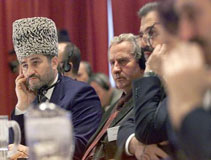|
Germany Wants Talks on Chechnya at E.U.-Russia Summit, Maskhadov Offers Peace Talks
 |
|
The Chechen delegation in Denmark offered Moscow peace talks
|
BERLIN,
October 28 (IslamOnline & News Agencies) - Germany wants the
Chechnya conflict on the agenda of a summit between the European Union
(E.U.)and Russia in Brussels next month, a Foreign Ministry spokeswoman
said Monday, October 28.
Meanwhile,
Chechen fighters reopened the door to peace talks with Russia to end its
bloody war in the independence-seeking republic.
The
German spokeswoman said it was essential for the E.U. and Moscow to
address the bloody anti-independence war in the southern republic at the
November 11 summit – as well as other issues affecting bilateral
relations.
"The
subject of Chechnya has always been on the agenda of political dialogue
between the European Union and Russia," she said, quoted by Agence
France-Presse (AFP).
She
also welcomed the fact that the two-day World Chechen Congress could go
ahead despite protests from Russia, which was incensed it was taking
place only days after the end of the Chechen hostage-taking crisis in
Moscow.
"It
would not have been possible or right to cancel such a conference in
Germany either," she said.
Denmark,
which currently holds the rotating E.U. presidency, refused to bow to
Russian demands over the weekend to stop the congress in Copenhagen.
However,
in a step to placate the Kremlin, it announced it was moving the summit
- aimed at developing a strategic partnership and settling a row over
the Russian enclave of Kaliningrad - to Brussels.
For
their part, representatives of the elected government in Chechnya said
they were open to peace talks with Russia to end the conflict.
"There
is no military solution to the conflict, only a political
solution," Akhmed Zakayev, the envoy of elected Chechen President
Aslan Maskhadov, said at an international conference on Chechnya that
aroused fury in Moscow.
"President
Maskhadov is ready to negotiate without preconditions, as he said
before. Now it is up to the Russian leadership," Zakayev said
through an interpreter.
Maskhadov,
for his part, warned Russian President Vladimir Putin that more
retaliatory attacks were inevitable unless he seeks a peace settlement.
"There
is no military solution," he said in a telephone interview with
AFP. "You will never be able to crush the Chechen people and bring
it to its knees. There is one reasonable, correct step – to sit down
at the negotiating table.
“All
the rest is death, blood, hostages and the death of absolutely innocent
people," added Maskhadov, in his first public statement since the
Moscow theater hostage crisis.
The
Russian authorities have ruled out all talks with Maskhadov since
Chechen fighters launched an independence campaign in the southern
republic in October 1999, and peace looked even more elusive after the
three-day hostage drama.
The
two-day World Chechen Congress opened as Russia was holding a day of
national mourning to honor the more than 115 hostages, most of whom died
from a mysterious gas used when Russian forces stormed the Moscow
theater to break the siege.
The
Kremlin accused the Danish authorities of "solidarity with
terrorists" and threatened to boycott a November 11 summit with the
European Union.
However,
Danish Foreign Minister Per Stig Moeller defended the meeting, saying
Copenhagen could not cancel the Chechnya meeting but that it had moved
the November 11 summit to Brussels in order to maintain good relations
with Moscow.
"The
participants at this [Chechnya] conference are not terrorists,"
Moeller told Danish television. "We decided to transfer [the
summit] because it is essential to avoid a crisis between Russia and the
E.U.," he added.
Moeller
said the E.U. wanted to "strengthen relations with Russia, and
there is too much at stake to let these relations deteriorate over this
affair."
The
congress, planned by the Chechen Diaspora and the Danish Center for
Holocaust and Genocide Studies, was focusing on the war in the Caucasian
republic and the problems of refugees and internally displaced persons.
Danish
opposition deputy Holger Nielsen told AFP before addressing the meeting:
"I don't understand how the Russians can imagine that any Danish
government can cancel a meeting like this. We have a democracy in
Denmark, we have democratic rights to hold meetings like this."
Nielsen
described the hostage-taking as "a disaster for the Chechen
cause."
Russia
is guilty of state terrorism, Mohammad Shishani, president of the World
Congress of Chechen Diasporas, told delegates, adding that the desperate
Chechens who seized the Moscow theater were "freedom
fighters".
"The
hostage takers in the Moscow theater were young men and women... driven
by desperation to abnormal actions" he said.
In
a separate related development, Russian Communist Party leader Gennady
Zyuganov broke ranks with other Russian politicians Monday and
criticized the death of 115 hostages in a weekend rescue operation in
Moscow as "unjustifiable."
"More
than a hundred deaths, serious physical and mental trauma for a huge
number of people, these are unjustifiable losses. The authorities were
incapable of taking preventative measures to stop such actions," he
said in an interview with the Nezavisimaya Gazeta newspaper.
The
Communist leader demanded an emergency joint session of both houses of
parliament to "examine the state of national security."
"All
security structures have been shattered and we believe that we no longer
have an efficient government," Zyuganov added.
Commenting
on Chechnya, Zyuganov said that "there is not and never has been a
military solution to Chechnya."
Moscow
should "prepare a plan for the economic reconstruction of the
republic, a plan for a political settlement. If Chechnya produces
nothing, if children aged 10 don't go to school, and if they have
nothing to occupy, then you won't achieve anything there with military
methods," he declared.

|